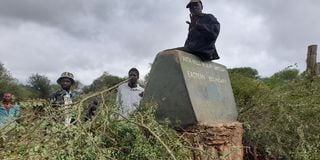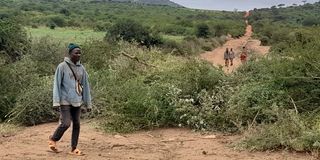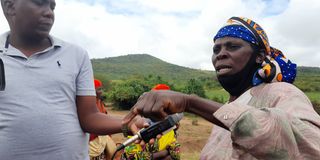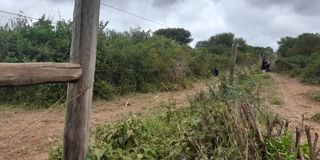Locals accuse KWS of grabbing mineral-rich land in Taita Taveta

A beacon showing the boundary between Taita Hills Wildlife Sanctuary and Alia community land in Mwatate, Taita Taveta County. The residents are accusing the sanctuary of trying to grab their land by allowing KWS to erect an electric fence past the beacon.
The government's plan to build a Sh40 million electric fence in Alia, Mwatate in Taita Taveta County, has angered residents who are now accusing the wildlife agency of planning to grab their mineral-rich land.
The residents claimed that the project, if allowed to continue, would see their farms, mining fields and homes, where they have lived since the 1980s, fenced off.
The over 2,000-acre piece of land is at the centre of the row after the Kenya Wildlife Service (KWS) resumed the construction of the fence last week after work stopped in 2019 due to a court case.
Residents vowed not to allow work to continue, claiming that more than 3,500 residents will be displaced by the fencing.
Electric fence
The project includes construction of the fence around the huge tracts of land claimed by the Taita Hills Wildlife Sanctuary and Lwalenyi Ranch Ltd.
The 30-kilometre electric fence will cover Choke, Kutima, Lwalenyi and Taita Hills Wildlife Sanctuary and is intended to prevent persistent human-wildlife conflicts in Alia, Mwachabo, Bura and Mwaktau areas.
The project suffered a blow in 2019 after it was met with a lot of resistance.
"Why is KWS pushing to expand its boundaries to our farms? They have enough land for their wildlife so they should leave our farms and mining fields. We depend on this farm for our livelihoods," said the secretary of Alia Farmers Association, Ms Dorah Chao.
KWS owns Tsavo National Park, which occupies over 62 per cent of land in Taita Taveta County.

Residents block the Lwalenyi access road in Mwatate, Taita Taveta County protesting to construction of an electric fence by KWS. They said over 3,500 Alia community members will be displaced if fence is erected.
More community land
Ms Chao said the project will acquire more community land, contrary to an earlier agreement by all stakeholders including KWS, leaders and the community.
The residents wanted the fence to follow gazetted KWS boundaries.
She termed an alleged agreement entered between the local community and Taita Hills Sanctuary as fake, saying they were not involved in the resolution of the boundary dispute.
"In 2013, the sanctuary came with an agreement claiming that the land is theirs. We declined because we had won a court case, which had ruled that we were the owners of this land," she said.
Legal boundaries
The agreement, seen by Nation.africa, states that the legal boundaries of the Taita Hills Wildlife Sanctuary include land currently occupied by the Alia community.
"That the local administration attest to the legal boundary of the Taita Hills Wildlife Sanctuary as all areas that includes and encompasses land presently occupied by the community of Alia certified as legal boundary by the National Land Commission," states the agreement.
Ms Chao accused local leaders of failing to intervene in the growing dispute.
"KWS had said that the fence would be temporary but we were later told that the fence will be here permanently. Why did they use lies for us to give in?" Ms Chao wondered.
Another resident, MR Donald Mkongo, called for the fencing to be halted until an agreement over the boundary is reached.
"I have nowhere to go. I have been living here since 1987. This is where my family calls home. As you have seen, we have invested in farming and mining but someone wants to grab our land from us," he said.

Ms Dorah Chao speaks to journalists in Alia village, Mwatate in Taita Taveta County. She said leaders are not willing to address their plight.
Rich in minerals
The residents now claim that the project, which was expected to benefit locals, will instead deprive them of their land.
The land in contention is also rich in gemstones and copper.
A miner, Mr Flumence Maghanga, said his site will be fenced in if the project continues. He said he has been mining on the land since 1973.
"We are aware that some investors are eyeing this area because of its minerals. We will not allow that," he said.
Last week, the residents got agitated after KWS officers failed to show up for a meeting that had been called to come up with an amicable solution to the dispute.
The residents claim that the takeover of the land by investors was shrouded in secrecy and controversy since they were not involved.
"Since we came back in 1999, we embarked on fulltime farming and small-scale mining to earn a living. We have nowhere to go to because this is our land," said another resident, Mr Charity Zighe.

Part of the Sh40 million Bura-Alia electric fence in Mwatate, Taita Taveta County whose erection has been stopped by protesting residents.
Human-wildlife conflicts
The county is a human-wildlife conflict hot-spot, with frequent invasions by wild animals, especially elephants, from the neighbouring Tsavo National Park.
The residents claim that the government, through KWS, is doing little to mitigate the situation. Compensation for loss of life and property rarely comes, they say.
Mwatate MP Andrew Mwadime called for sobriety and inclusion of all in handling the boundary dispute.
Petition
He said a petition had been lodged at the National Assembly by the Chawia council of elders in an effort to end the dispute.
"This matter has been politicised but I'm doing my best to resolve the dispute," he said.
However, the residents said they are not aware of the petition since those who had drafted it were not members of their community and they did not involve them in the process.





